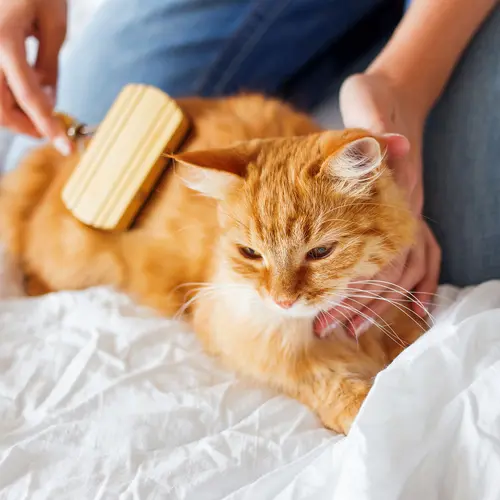Flying squirrels are wild animals that are also occasionally kept as pets. They’re considered exotic animals and it may be illegal to have one in your state so make sure you check if they’re legal where you live before getting one. You may need a permit to own a flying squirrel.
Flying squirrels have small pink noses, large eyes, and long, furry tails making them extremely cute. They also have sharp teeth, a lot of energy, and are nocturnal.
Do Flying Squirrels Make Good Pets?
Two types of flying squirrels are native to North America. They are the northern and southern flying squirrels. The southern flying squirrel is the smallest with gray hair and a white belly. The northern flying squirrel has gray-brown hair and a gray belly.
If cared for properly, flying squirrels can be affectionate pets. The first few weeks after bringing them home is the most important. Hand feeding and daily handling will help them bond with you.
Due to flying squirrels’ exotic status, they are illegal to own in 26 states. This is because flying squirrels are being trapped in their native habitat and trafficked to different countries. Even though they’ve been banned in certain states, they are still getting smuggled in. If you want a flying squirrel, you should research legal and ethical ways to get one.
Problems With Pet Flying Squirrels
Before taking one on as a pet you should know some things about them.
They’re social animals. Flying squirrels need a lot of attention. Getting a companion for your flying squirrel is a good way to keep them happy. They shouldn’t have a problem with other animals in your home but do require supervision when out of their cage.
They have a sharp bite. Flying squirrels have strong, sharp teeth that can make their bite painful. Domesticated flying squirrels are less likely to bite but, like most animals, can attack if provoked.
They can have destructive habits. Flying squirrels can be destructive as they are rodents and constantly chewing.
They are nocturnal. They can be very active at night which could interrupt your sleep.
They are a time commitment. Flying squirrels need owners who will feed them, carry them around, and be with them constantly. You’ll need to be ready to build your life around your new pet. Flying squirrels bond strongly, and it's not good for them to be ignored or rehomed.
Flying squirrels are illegally trafficked. Because flying squirrels are considered cute, exotic creatures, the demand to own one has created a dangerous flying squirrel smuggling ring. Flying squirrels are being taken from their natural habitat and sold as pets. This leads to unsafe conditions for flying squirrels and unsafe pets for people.
Caring For a Flying Squirrel
Bonding. Before you bring a flying squirrel home you should know that a baby is easier to bond with than an adult. Your flying squirrel will have a unique personality that you’ll want to get to know. Carrying your pet around in a loose shirt pocket or pouch will help you bond quicker to them.
Habitat. You’ll need to have a habitat ready for your flying squirrel. When they’re ready for a big cage, give them a water bottle, food, branches to climb on, and a nest box high in the cage. Give them toys and make sure their bedding is clean and dry.
Feeding. Flying squirrels will eat formula as a baby. They are omnivores. Their diet consists of fruits, nuts, veggies, insects, and protein (good high-protein treats include mealworms and crickets). They are prone to calcium deficiency and will need a supplement. Include fruits and vegetables in their squirrel feed as they get older.
Exercise. They are active creatures and nocturnal, so they will be running or playing while you’re asleep. You'll still need to get them out of their cage to give them exercise and prevent obesity.
It’s also important to find a vet that has experience with exotic animals and can keep your flying squirrel healthy with checkups.
Safety Concerns
Flying squirrels can carry parasites, lice, and fleas. Rabies is rare in flying squirrels, but they do have a sharp, painful. And they may bite if provoked or scared.
Flying squirrels can get infected with typhus and transmit the disease to humans. Typhus is spread through the feces of infected lice, but it can be treated with tetracycline therapy. If untreated, typhus can become severe and lead to other complications.
Flying squirrels can be good pets, but they can also be challenging animals to live with. If you want one, look into ethical rehabilitation sites where you can rescue them. Make sure you have plenty of time for them and are willing to create a strong bond.

